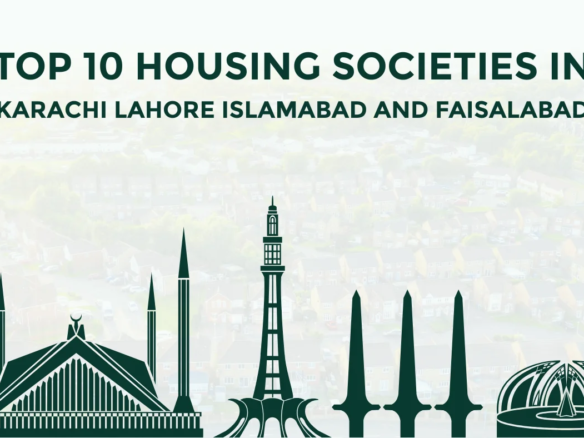Renting property has always been a prevalent practice in Pakistan, providing individuals and families with flexible housing options. However, with the advancement of technology, changing tenant preferences, and evolving government regulations, the future of property renting in Pakistan is undergoing significant transformations. This article delves into the key factors shaping the future of property renting in the country.
Technological Advancements in Property Renting
Online Property Portals
The digital landscape has revolutionized the property renting industry in Pakistan. Online property portals have emerged as a convenient platform for tenants to explore and discover available rental properties. These portals provide detailed property listings, including photographs, floor plans, and location information, enabling tenants to make informed decisions from the comfort of their homes.
Virtual Tours and 3D Walkthroughs
Virtual tours and 3D walkthroughs have become increasingly popular in the property renting market. Through immersive virtual experiences, potential tenants can visualize the property and get a sense of its layout and ambiance without physically visiting the location. This technology-driven approach saves time and offers convenience, particularly for individuals who cannot easily travel to inspect properties.
AI-Powered Property Recommendations
Artificial Intelligence (AI) is transforming the property renting landscape by offering personalized property recommendations based on tenant preferences. AI algorithms analyze data points such as location, budget, amenities, and tenant preferences to suggest suitable rental options. This technology streamlines the property search process, making it more efficient and tailored to individual needs.
Changing Tenant Preferences
Demand for Flexible Rental Options
In recent years, there has been a growing demand for flexible rental options in Pakistan. Many tenants prefer short-term leases or the ability to easily switch between properties based on their changing needs. The rise of digital platforms has facilitated the emergence of flexible rental models, providing tenants with greater flexibility and mobility.
Focus on Amenities and Community Living
Tenants are placing increased emphasis on amenities and community living when choosing rental properties. Modern developments are incorporating a range of amenities such as gyms, swimming pools, parks, and community centers to attract tenants. Additionally, the availability of amenities such as schools, healthcare facilities, and shopping centers in the vicinity of rental properties has become a significant factor in tenant decision-making.
Remote Work and the Need for Home Offices
The global shift towards remote work has also influenced tenant preferences in Pakistan. With more individuals working from home, the need for dedicated home offices or flexible workspace arrangements within rental properties has surged. Tenants are seeking properties that can accommodate their remote work requirements, such as spacious rooms, high-speed internet connectivity, and ergonomic workstations.
Government Regulations and Initiatives
Rent Control Policies
The government of Pakistan has implemented rent control policies to protect both tenants and landlords. These policies aim to regulate rent increases, prevent unjust evictions, and establish mechanisms for dispute resolution. The implementation of fair and transparent rent control policies instills confidence in tenants and encourages long-term renting arrangements.
Tenant Rights and Protection
Tenant rights and protection have gained significant attention in recent years. The government has introduced initiatives to safeguard tenants from unfair practices, ensuring their rights are respected. These initiatives include mechanisms to address maintenance issues, security deposit regulations, and the establishment of rent tribunals to resolve disputes effectively.
Property Rental Tax Reforms
The government has also initiated reforms in property rental taxation to promote transparency and discourage tax evasion. These reforms aim to create a level playing field for both landlords and tenants. The implementation of fair taxation policies ensures a more secure and accountable rental market for all stakeholders.
Rise of Co-Living Spaces
Shared Accommodations and Community Living
Co-living spaces have gained traction in Pakistan, especially among young professionals and students. These shared accommodations provide individual bedrooms with shared common spaces, fostering a sense of community among residents. Co-living spaces often offer additional amenities such as cleaning services, social events, and networking opportunities, enhancing the overall rental experience.
Benefits of Co-Living
Co-living spaces offer numerous benefits, including cost savings, increased social interaction, and a hassle-free living experience. Tenants can share the expenses of rent, utilities, and amenities, making co-living an affordable option for many. Additionally, co-living promotes networking and collaboration, creating opportunities for personal and professional growth.
Growing Popularity among Millennials and Gen Z
The younger generations, such as Millennials and Gen Z, are particularly drawn to co-living spaces. These demographics value experiences over material possessions and seek a sense of community and belonging. Co-living spaces cater to their preferences by offering a dynamic and vibrant living environment.
10 Tips for Selling Property in Pakistan
Sustainable and Smart Homes
Green Real Estate: The Future of Sustainable Development in the Real Estate Industry
Energy Efficiency and Green Building Practices
Sustainability has become a key consideration in the property renting market. Property developers are incorporating energy-efficient features, green building practices, and renewable energy sources into their projects. These initiatives not only reduce environmental impact but also offer cost savings to tenants through reduced utility bills.
Integration of Smart Home Technology
Smart home technology is increasingly being integrated into rental properties, enhancing convenience and security. Tenants can control various aspects of their homes, such as lighting, temperature, and security systems, through mobile apps and voice commands. The integration of smart home technology enhances the overall living experience and aligns with the evolving digital lifestyles of tenants.
Cost Savings and Environmental Benefits
Sustainable and smart homes offer long-term cost savings for both landlords and tenants. Energy-efficient practices reduce utility costs, while smart home technology optimizes energy consumption. Moreover, these initiatives contribute to a greener future by reducing carbon emissions and conserving natural resources.
Conclusion
The future of property renting in Pakistan is set to be shaped by technological advancements, changing tenant preferences, and progressive government regulations. Online property portals, virtual tours, and AI-powered recommendations will continue to enhance the property search process. Flexible rental options, focus on amenities and community living, and the demand for home offices will reshape the rental landscape. Co-living spaces, sustainable and smart homes, and tax reforms will also play pivotal roles. As Pakistan moves forward, the property renting industry is poised for exciting transformations that will cater to the evolving needs and aspirations of tenants.
FAQs (Frequently Asked Questions)

Is property renting a popular choice in Pakistan?
Yes, property renting is a popular choice in Pakistan due to its flexibility and convenience.
How can technology improve the property renting process?
Technology can improve the property renting process by offering online property portals, virtual tours, and AI-powered property recommendations.
What are the advantages of co-living spaces?
Co-living spaces offer cost savings, increased social interaction, and a hassle-free living experience.
What initiatives has the government taken to protect tenants?
The government has implemented rent control policies, established tenant rights and protection initiatives, and reformed property rental taxation.
How do sustainable and smart homes benefit tenants?
Sustainable and smart homes offer cost savings through energy efficiency, enhanced convenience through smart home technology, and contribute to environmental conservation.



Join The Discussion